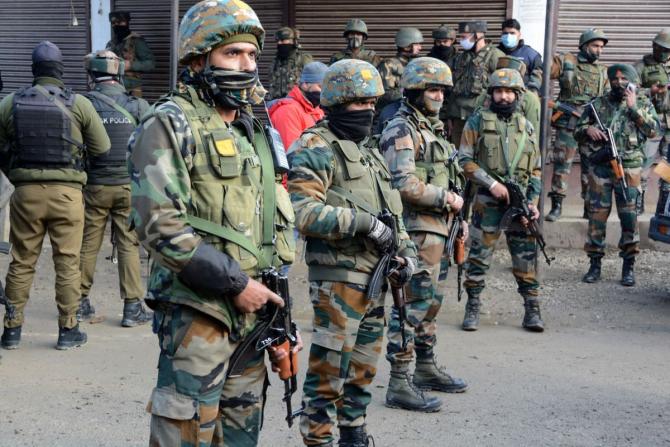 | « Back to article | Print this article |
The Centre on Wednesday urged the Supreme Court that its 2018 verdict decriminalising adultery under the Indian Penal Code (IPC) be not made applicable to the armed forces as it may cause 'instability' within the services.

After the plea was made, a bench comprising Justices R F Nariman, Navin Sinha and K M Joseph issued notice to a PIL petitioner Joseph Shine and others and referred the matter to Chief Justice S A Bobde for setting up of a five-judge Constitution Bench which can clarify the position.
'Issue notice. Since the clarification is on a Constitution Bench decision, it is appropriate that the Chief Justice issues orders to post this matter before a bench of five Judges.
'The Registry is directed to place the matter before the Chief Justice for appropriate orders,' the bench said in its order.
The plea was made in an interim application filed through lawyer Sachin Sharma on behalf of the Ministry of Defence.
'The judgment may cause instability within the Applicants Services, as Defence Personnel are expected to function in peculiar conditions, during the course of which many a time they have to stay separated from their families for long durations, when they are posted on borders or other far-flung areas or in areas having inhospitable weather and terrain,' it said.
The plea said the support system to families is provided by creation of 'Field Area Family Accommodation', where families are cared for by local formations and units while their spouses are away serving in forward locations, very often in combat situations.
'To ensure that all personnel perform their duties without unnecessary-concern for their families, there is a system where frequent visits to families living away from their spouses by Officers/JCOs, is a regular feature.
'In view of the aforesaid (2018) judgment, there will always be a concern in the minds of the army personnel who are operating far away from their families under challenging conditions about the family indulging in untoward activity.'
The plea said the apex court, while deciding the constitutionality of Section 497 of the IPC, apparently had not taken into account the peculiar service conditions of Defence Personnel and the fact that the framers of the Constitution had specifically authorized Parliament for abrogation of their fundamental rights in terms of Article 33 of the Constitution.
During the hearing, Attorney General K K Venugopal said that under the relevant rules of armed forces, adultery is a ground for court martial for unbecoming conduct and therefore armed forces should be exempted from the purview of the 2018 judgment of the Constitution bench.
He said a clarification is needed in this regard from the top court on the applicability of the verdict in armed forces.
In a path-breaking verdict, a five-judge Constitution bench headed by the then CJI Dipak Misra unanimously struck down Section 497 (adultery) of the IPC and declared that adultery is not a crime and the penal provision was unconstitutional as it dented the individuality of women and treated them as 'chattel of husbands'.
The apex court in the September 2018 judgment, however, had said that adultery would continue to be a ground for seeking divorce in matrimonial disputes.
The Centre, in its interim application filed in a disposed of PIL of Joseph Shine, has sought clarification and a direction that the judgment be not made applicable on special statutes and rules governing the armed forces which take actions on its personnel for indulging in adulterous relationships to ensure discipline in forces.
The application contended that when jawans and officers are posted in forward inhospitable areas their families are taken care of at base camp by other officers and the laws and rules, providing actions for indulging in adulterous or promiscuous activity, help in maintaining discipline.
An armed forces personnel can be cashiered from service on grounds of unbecoming conduct for committing adultery with a colleague's wife, it said.
Section 497 of the IPC says: 'Whoever has sexual intercourse with a person who is and whom he knows or has reason to believe to be the wife of another man, without the consent or connivance of that man, such sexual intercourse not amounting to the offence of rape, is guilty of the offence of adultery.'
Adultery was punishable by a maximum five years in jail or fine or both.
Striking down the law, the apex court had said that section 497 of the IPC was manifestly arbitrary, archaic law which is violative of the rights to equality and equal opportunity to women.